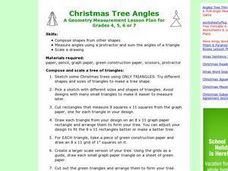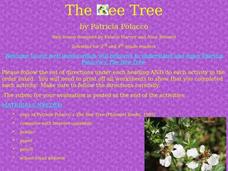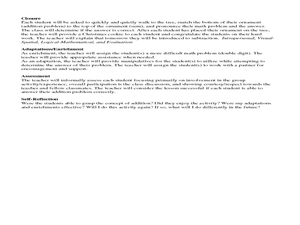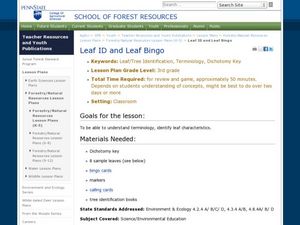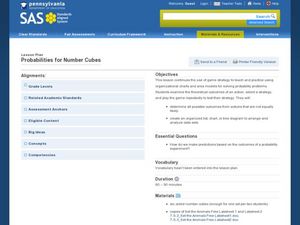Curated OER
Look At Those Leaves!
Students explore botany by researching plants in class. In this tree identification lesson, students examine a group of leaves and list the different characteristics before guessing what types of trees they came from. Students read about...
Curated OER
Tree Identification
Young scholars are introduced to the characteristics of trees and different techniques to identify them. They distinguish between a deciduous and a coniferous tree. Students describe at least four characteristics used to identify trees....
Curated OER
Identifying Trees Using Their Leaves in the Summer
Students discover how to identify trees. For this research lesson students use dendrology to decipher what a trees classification is and explore each trees traits.
Curated OER
Christmas Tree Angles
In this angles worksheet, learners measure angles to make triangles and cut them out to make a Christmas tree. Students draw and cut 5 triangles to make their tree.
Curated OER
Creating Family Trees
Pupils make presentations about families. They make family trees and present orally to the class.
Curated OER
The Bee Tree
Students engage in a variety of activities arranged around the reading of the book "The Bee Tree". This book will help students to understand the purpose of how an ecosystem can work together and that organisms influence each other for...
Curated OER
Classroom Christmas Tree
Students practice their addition by participating in a Christmas Tree activity. In this holiday math lesson, students complete math problems at their desk and match their answers with ornaments on a tree. Students are given an ornament...
Curated OER
The Tree that Would Not Die Lesson 10 Vocabulary
In this language arts worksheet, students learn 45 new vocabulary words from The Tree that Would Not Die. Words are arranged according to phonograms. There are no questions to answer; this is a vocabulary list.
Curated OER
The Tree that Would Not Die Lesson 7
In this language arts learning exercise, students learn 45 new vocabulary words taken from the book The Tree that Would Not Die. The words are arranged in a list according to their phonograms. There are no questions to answer; this is...
Curated OER
The Tree That Would Not Die Lesson 9 Vocabulary
In this language arts worksheet, students learn 45 vocabulary words from Lesson 9 in The Tree that Would Not Die. Words are arranged by phonograms. There are no questions on the page; this is a vocabulary list.
Curated OER
The Tree that Would Not Die Lesson 3
In this language arts instructional activity, students learn 45 vocabulary words from Chapter 3 of The Tree that Would Not Die. The words in this vocabulary list are arranged according to phonograms. There are no questions on the page;...
Curated OER
The Tree that Would Not Die Lesson 4
In this language arts activity, students learn 45 new vocabulary words from the book The Tree that Would Not Die. The words are arranged by phonograms. There are no questions on the page; this is a word list.
Curated OER
The Tree That Would Not Die Lesson 8
In this language arts activity, students learn 45 new vocabulary words from Chapter 8 of The Tree that Would Not Die. Words are arranged by phonograms. There are no questions on the page.
Curated OER
Basic Counting Principle
Students find the number of possible arrangements of several objects by using the Basic Counting Principle. In this math lesson, students divide into groups and determine the number of possible sandwiches which can be made given certain...
Curated OER
Totally Trees
In this exploration of leaves worksheet, students go on a scavenger hunt to find leaves with certain characteristics such as palmate veination. They look for 14 leaf types.
Curated OER
Biomes
Arranged as an interactive lesson, this presentation focuses on the six world biomes. Upcoming biologists click on a specific biome and a slide lists its location, description, native plants, and animals. A quiz provides learners with...
Curated OER
Leaf ID and Leaf Bingo
Third graders explore the parts of a leaf and use a dichotomy key to identify leaves. In this biology lesson, learners study characteristics of various leaves and play a game of bingo to identify leaves by their traits. Students find and...
Curated OER
Probabilities for Number Cubes
Middle schoolers explore the concept of probability. In this probability lesson, students roll a six-sided number cube and record the frequency of each outcome. Middle schoolers graph their data using a frequency chart and keep tally...
Curated OER
Data Management and Probability: Applications
For this data management and probability applications worksheet, 7th graders solve 13 different types of problems that include finding the mean, median, mode, and range of each set of values, as well as, solving a number of word...
Curated OER
Measuring and Identifying Trees with the Help of Technology
Middle schoolers arrange themselves into small groups. Each group chooses a distance to measure ( the distance between the slide and the swings, for instance). Person #1 walks the distance, counting the number of his or her steps. ...
Exploring Nature Educational Resources
Building A Classroom Food Web
From bears and owls to chipmunks and trees, all life depends on the sun for the energy to survive. Young biologists develop an understanding of this big idea as they arrange this series of plant and animal picture cards into food webs...
Curated OER
Cinnamon Ornaments
Students create keepsake cinnamon ornaments to hang on the family Christmas tree or in a window. They mix ingredients to form dough, create an ornament and write a message to accompany the ornament.
Curated OER
History's Thermometers
Ancient coral beds give scientists clues to past ocean temperatures in much the same way that tree rings indicate historical weather conditions. High school scientists examine coral oxygen isotope ratios and plot the data as a function...
Rice University
Calculus Volume 3
See calculus to the end. The eBook is the last of a three-volume series covering college-level calculus topics. Scholars begin with parametric equations and polar coordinates before moving to vectors, finally ending with multi-variable...





